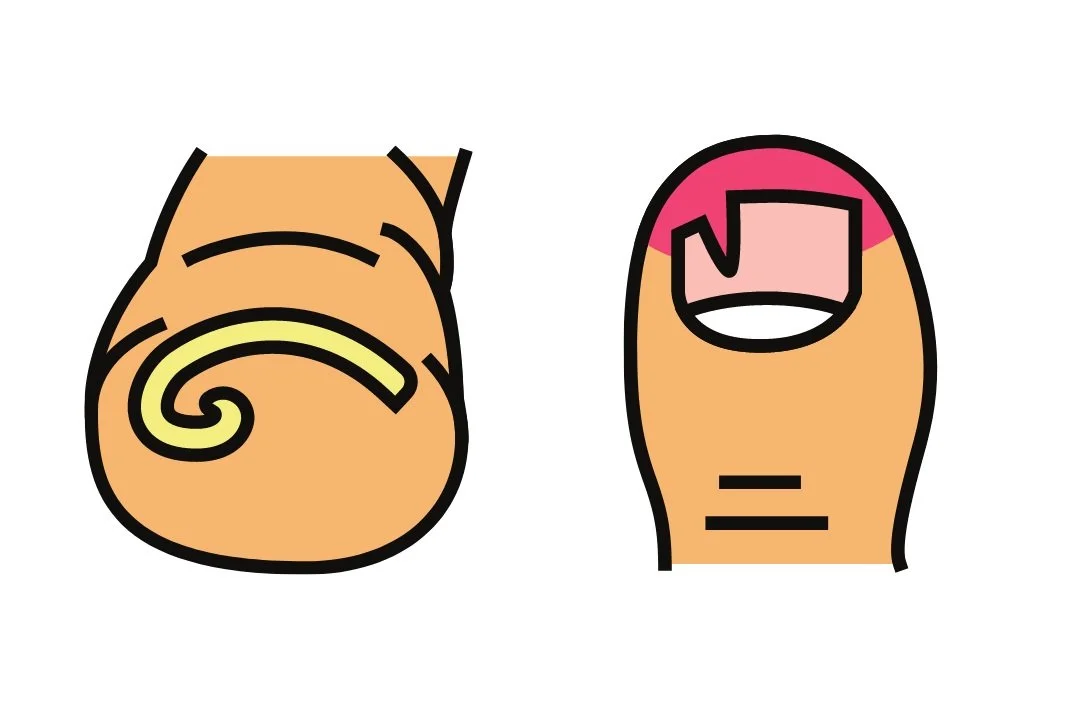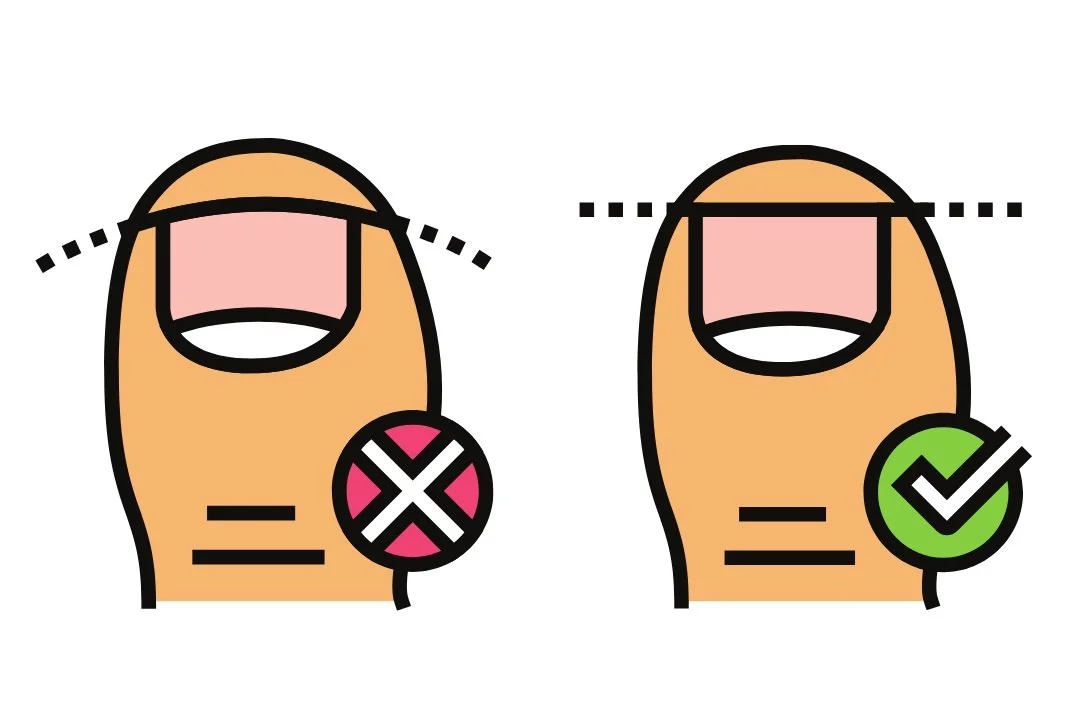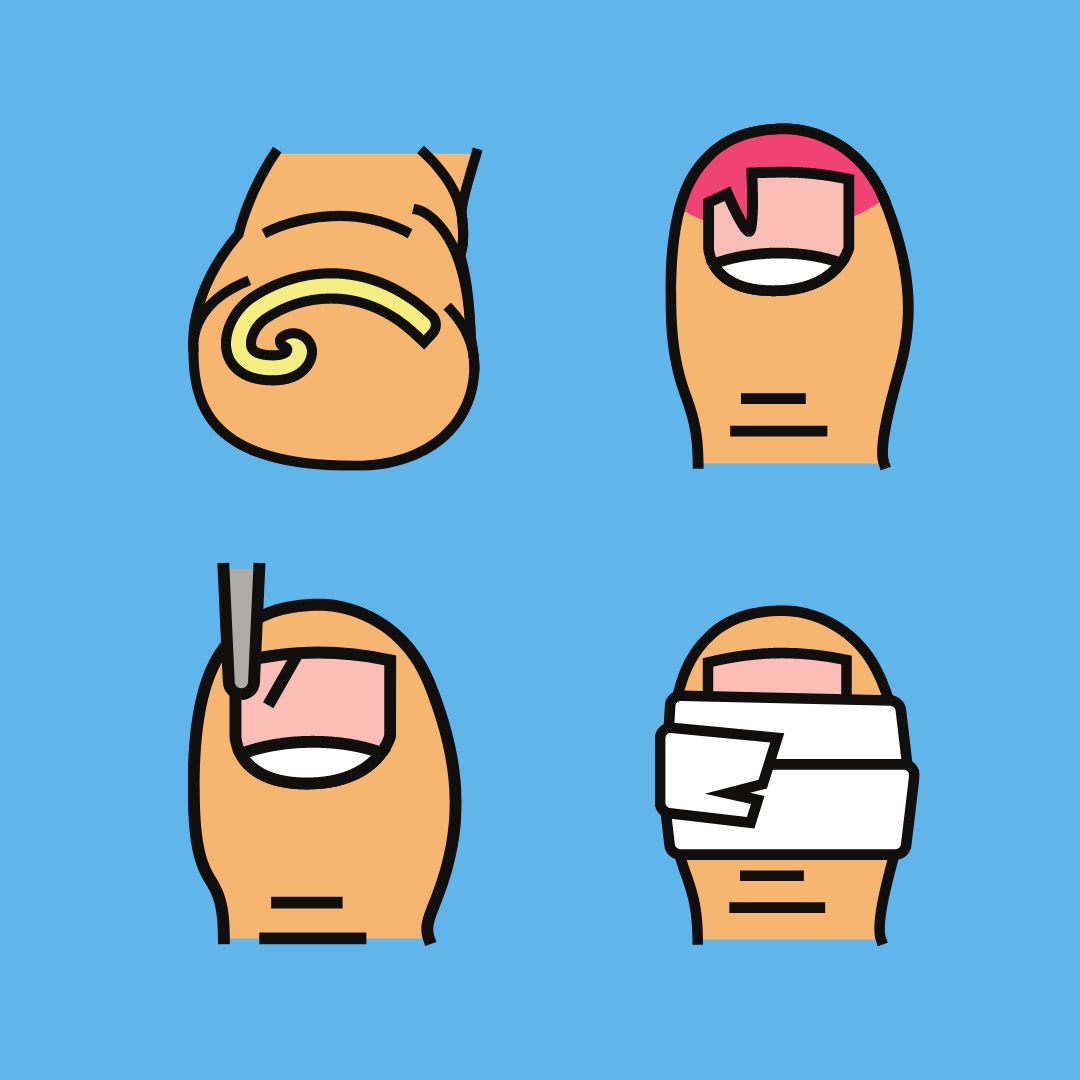An Ingrown toenail is a painful and very common foot condition where the side of the nail curls down and grows into the skin around the nail.
Ingrown Toenails
At Relief Podiatry, we see this every week, and we know how uncomfortable it can be.
Whether you’re dealing with a mild case or a recurring, bad ingrown nail, our team provides safe, effective solutions.
If you’ve been searching for ingrown toenail treatment from a trusted professional, you’re in the right place. Our talented podiatrists specialise in ingrown nail treatment, from conservative care to surgical removal if needed.
What Causes Ingrown Toenails?
There are many reasons why ingrown toenails occur, the most common of which is improper/incorrect cutting of the toenail. Excessive trimming leaves behind a jagged edge called a ‘spicule’. Other causes for ingrown toe nails include:
Trauma from tight footwear
Direct injury
Genetic nail shape
Excessive swelling of the surrounding skin
Chronic fungal nail infections can change the shape of the nail, causing the nail plate to curve down on either side or become splintered or jagged.
Painful ingrown toenails, if left untreated, may become infected, leading to overgrowth of chronically inflamed tissue. This overgrowth of tissue is referred to as hypergranulation. Hypergranulated skin is very red, very swollen and highly vascular, so it bleeds very easily.
Visiting nail salons or attempting to cut the ingrown out at home with unsterilised tools can make matters even worse, and an untreated case can develop into an infected ingrown nail.
Symptoms of Ingrown Toenails
If you’re not sure whether you need help, here are some common warning signs to look out for:
Persistent pain or tenderness along the nail edge
Swelling and redness at the side of the nail
Drainage or pus: When spotted on the toe, an ingrown nail infection is the likely cause
When symptoms progress to infection, prompt ingrown nail infection treatment is essential to avoid long-term complications.
What Is an Ingrown Toenail?
Also known as ‘onychocryptosis’, ingrown nails may involve redness, pain, swelling or even infection in the skin surrounding the nail. Without treatment from a podiatrist, an ingrown nail can progress into an infected ingrown nail, making walking and wearing shoes incredibly painful.
Common signs include:
Pain or tenderness where the nail edge meets the skin
Swelling and redness around the toe
Warmth or pus, which may indicate infection
Failure to have the problem addressed by an ingrown nail podiatrist may even lead to chronic inflammation. That’s why early care makes such a difference.
Our Podiatrists are highly skilled in the treatment of ingrown nails. Therapy options range from conservative care to more permanent, surgical solutions.
When to See a Podiatrist for an Ingrown Toenail Treatment
It’s time to see a specialist ingrown nail podiatrist if:
Pain doesn’t settle after a few days
You notice signs of infection (swelling, pus, bleeding)
The nail keeps growing back in the wrong direction
Home remedies aren’t helping
Seeking early podiatrist ingrown nail treatment saves you from repeat infections and unnecessary pain, especially when you trust the team at Relief Podiatry. Our Sydney-based podiatrists provide a safe, sterile environment and solutions that actually work and last.
Ingrown Nail Treatment Options at Relief Podiatry
Conservative Treatment
First-line, conservative treatment involves gentle clearing and cleaning of the nail edge every few weeks, along with footwear modification.Partial Nail Avulsion (PNA) Surgery
For a more permanent solution for chronically infected, painful nails, we offer Nail Surgery. This procedure is called a Partial Nail Avulsion (PNA). It is a minor surgical procedure performed by our Podiatrists as a long-term medical solution to chronic, persistent or highly sensitive ingrown toenails.
PNAs have an excellent success rate and result in minimal downtime for the patient. In fact, our patients can walk away immediately after the procedure!
A PNA is generally safe for most individuals. Still, each person must consult their Podiatrist to make sure the procedure is appropriate for them and that there are no medical complications.
A Partial Nail Avulsion (PNA) is a treatment for ingrown nails that is performed in-clinic under local anaesthetic by our specialist Podiatrists. It’s designed for long-term relief and has a very high success rate.
Recovery is typically straightforward, and most patients walk out of the clinic immediately following the procedure. If you’ve been living with a bad ingrown nail or repeated infections, this is often the most effective option.Ingrown Nail Infection Treatment
If your ingrown nail has become infected, our podiatrists will:
- Carefully clean the area
- Dress the toe
- Prescribe antibiotics if necessary
Attempting DIY “bathroom surgery” at home is not recommended, as it can spread the infection. Professional ingrown nail infection treatment is always the better option.
Preventing Ingrown Toenails
Once treated, we want to avoid the problem recurring. Here are some simple prevention tips:
Cut your toenails straight across, not curved
Wear shoes that give your toes ample room
Manage fungal infections early with professional care, such as our highly effective fungal nail laser therapy
A few small changes go a long way in preventing another painful, inconvenient episode.
Why Choose Relief Podiatry?
At Relief Podiatry, we provide same-day appointments for urgent treatment of painful or infected ingrown toenails. Our team combines evidence-based care with a down-to-earth approach, so you’ll always feel comfortable and supported.
Our focus is on long-term solutions, not just quick fixes, so our ingrown nail podiatrist team use the latest equipment and techniques to ensure safe, lasting results.
With a friendly approach and same-day care available, we’re standing by to quickly and efficiently help you walk pain-free again.
Book Your Ingrown Nail Treatment Appointment Today
Please don’t put up with ingrown nail toe pain any longer; let us help you get back on your feet.
Book online or call our friendly clinic team today
Location
Relief Podiatry
Shop 2, 195 Lakemba St
Lakemba NSW 2195




